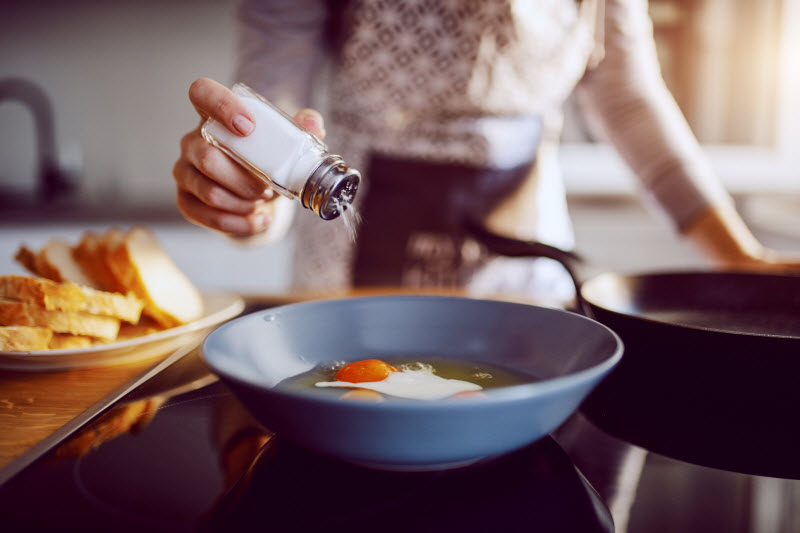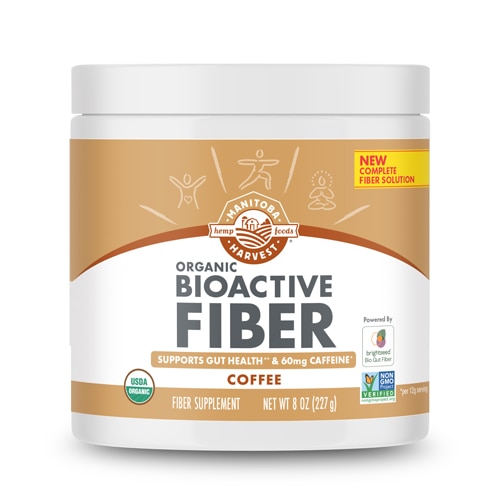[vc_row][vc_column][vc_column_text]Cutting back on salt to keep blood pressure in check is standard advice. But science tells a more complicated story about how salt interacts with your body—particularly your gut
microbiome. High sodium intakes can affect the number and type of microbes in your gut, which may have a much bigger impact on your health than simply elevating your blood pressure.

Salt and gut health: What's the connection?
Your gut is the first place salt is absorbed during digestion. The intestinal epithelium—a layer of cells that lines the small and large intestines—contains proteins called Na+/H+ exchangers (NHEs) that transport sodium into cells and help maintain sodium balance. If the balance gets thrown off by something like a high-salt diet, the gut microbiome can get out of whack, too.
Rodent studies show the potential consequences of this domino effect. When you eat too much salt, it may:
These changes may be dose-dependent, meaning the effects become more significant as salt intake increases. Because microbiome diversity and SCFA production have been shown to influence health throughout the body, a reduction in one or both may increase the risk of developing the chronic, low-grade inflammation associated with conditions like obesity, metabolic disorders and cardiovascular disease.
High-salt diets and inflammation
Salt-induced changes in the gut microbiome appear to be instrumental in the development of inflammation. Eating too much salt may
increase the number of a kind of immune cells called Th17 cells, which produce pro-inflammatory cytokines—proteins that trigger inflammatory responses from the immune system.
This increase may be a direct result of the
reduction of microbes like Lactobacillus that produce SCFAs and other beneficial compounds. Some of these compounds may control levels of both
Th17 cells and
pro-inflammatory cytokines, but when gut microbes are affected by a high-salt diet, fewer compounds are available to keep inflammation at bay.
High salt intake may also contribute to inflammation by disrupting normal immune responses. In one study on mice, a high-salt diet
caused a protein called IsoLG-adducted protein to accumulate in dendritic cells—specialized immune cells found in tissues like the gut lining that have contact with the outside world. Dendritic cells help regulate immune responses by presenting potential antigens to other immune cells for recognition and removal. High levels of IsoLG-adducted protein in dendritic cells prompt the release of pro-inflammatory cytokines, which may lead to reactions
similar to autoimmunity.
How to eat less salt and reduce gut inflammation
Because inflammation can have such significant effects on health—
including your blood pressure—it's a good idea to pay attention to the amount of salt in your diet. The American Heart Association recommends keeping your sodium intake under 2,300 milligrams per day but suggests working your way down to
1,500 milligrams or less.
Note that some people may be more sensitive to salt than others due to factors like age, ethnicity and genetics. If you have a condition like high blood pressure, heart disease or diabetes, talk with a qualified dietician or nutritionist to determine your optimal sodium intake.
High-salt foods to avoid
Most sodium in Western diets comes from prepared and packaged foods, but it can also hide in unexpected places. To
cut back on your daily dose of salt:
- Switch to low-sodium or salt-free canned foods like tomatoes and beans
- Look for low-sodium or no-salt-added breads
- Avoid processed meats like bacon, jerky and deli meat
- Choose low-salt or unsalted nuts, seeds, nut butters and seed butters
- Replace breakfast cereals with home-cooked oatmeal
- Go easy on cheese (one ounce can have 500 milligrams or more of salt)
- Cook meals at home instead of ordering from restaurants (where you could easily eat over 5,000 milligrams in one sitting)
- Swap high-salt condiments and seasonings for salt-free versions
Low-sodium salt alternatives for gut-friendly flavor
Reducing your salt intake doesn't mean suffering through bland meals! You can keep you microbiome balanced while enjoying a wide variety of flavors. Try experimenting with
herb and spice combinations or salt-free flavor boosters like nutritional yeast or naturally flavored vinegars. To bring more depth of flavor to dishes like soups, throw in some sautéed mushrooms or add a piece of dried kombu seaweed to the broth.
And, of course, you can always whip up a few batches of homemade seasoning blends to have on hand. Check out this
spice list for some tasty inspiration!
[/vc_column_text][/vc_column][/vc_row][vc_row][vc_column][vc_text_separator title="Featured Products" border_width="2"][vc_row_inner equal_height="yes" content_placement="middle" gap="35"][vc_column_inner width="1/3"][vc_single_image image="177684" img_size="full" alignment="center" onclick="custom_link" img_link_target="_blank" css=".vc_custom_1724957977017{padding-right: 7% !important;padding-left: 7% !important;}" link="https://www.vitacost.com/bragg-organic-sprinkle-24-herbs-and-spices-seasoning"][/vc_column_inner][vc_column_inner width="1/3"][vc_single_image image="177681" img_size="full" alignment="center" onclick="custom_link" img_link_target="_blank" css=".vc_custom_1724958007065{padding-right: 7% !important;padding-left: 7% !important;}" link="https://www.vitacost.com/snap-supplements-gut-health"][/vc_column_inner][vc_column_inner width="1/3"][vc_single_image image="177682" img_size="full" alignment="center" onclick="custom_link" img_link_target="_blank" css=".vc_custom_1724958035808{padding-right: 7% !important;padding-left: 7% !important;}" link="https://www.vitacost.com/onnit-total-gut-health"][/vc_column_inner][/vc_row_inner][/vc_column][/vc_row]




